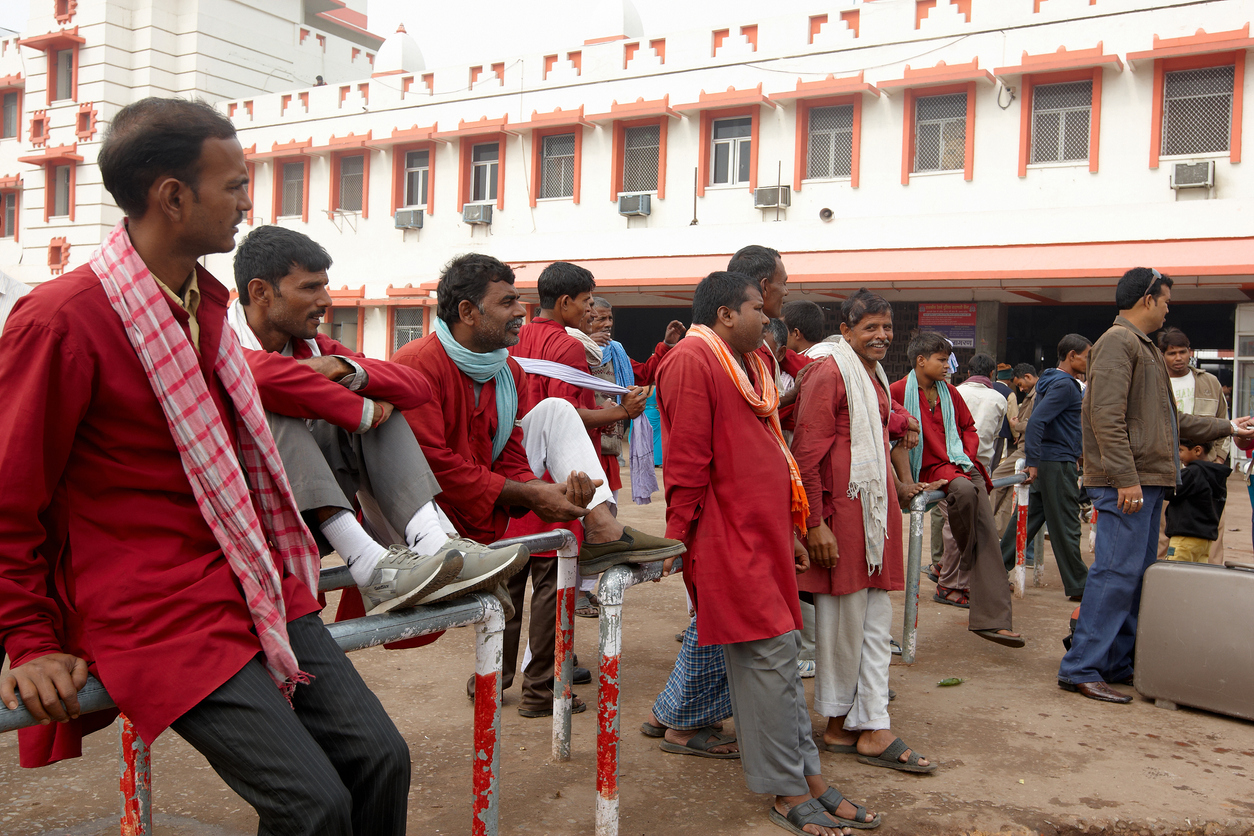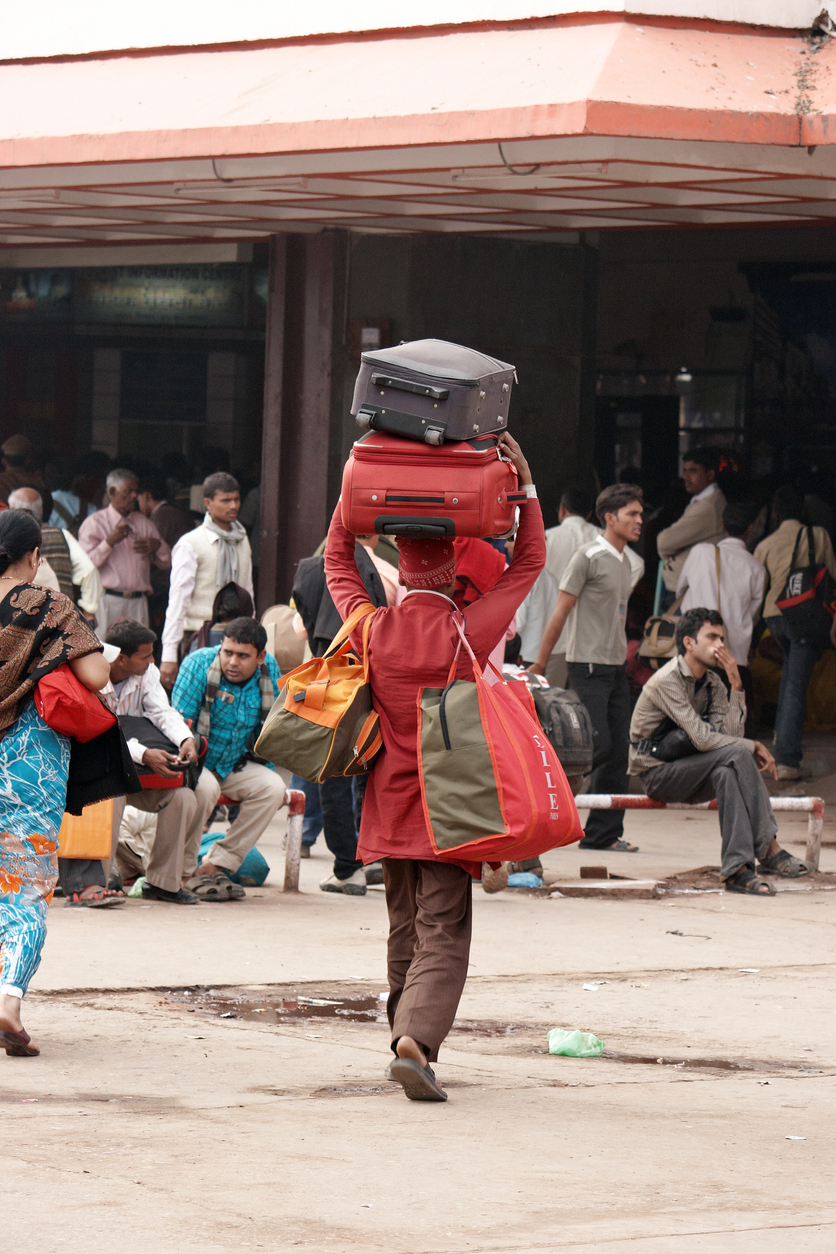

Lockdown derails livelihood, porters struggle to put life back on track
Trains may be getting back on track but not the lives of rail porters, scrambling for work after the lockdown in March slammed the brakes on their livelihoods and derailed their already precarious existence.

Living in the same vicinity as the novel coronavirus may be the new normal but the livelihoods affected due to the pandemic-imposed lockdown have been countless.
Trains may be getting back on track but not the lives of rail porters, scrambling for work after the lockdown in March slammed the brakes on their livelihoods and derailed their already precarious existence.
Imprinted in middle class India’s institutional memory with their red shirts and copper armbands, the band of mostly men who carry heavy bags on their heads and shoulders as they nimbly navigate steep staircases and crowded stations is teetering on the brink of poverty and hunger.

Their lives were once the stuff of tinsel romanticism remember the 1983 Amitabh Bachchan film Coolie but those days have faded away much like the trademark red of their uniforms now dulled to ash brick, said Sube Singh, who has been working as a porter for four decades.
“We have been surviving on chutney-roti or sometimes salt and roti. The landlord did not waive the rent. I do not have a ration card and I am living on borrowed money but for how long?” a despairing Singh asked.
“I have never seen such times in my entire 40 years as a coolie,” the 60-year-old, who lives in a rented room near the New Delhi Railway Station with a family of five, told PTI.
Several porters outside the station said they have not earned a rupee since the trains stopped on March 24, a day before the lockdown to curtail the spread of COVID-19 started on March 25.
They were the first to lose their livelihoods and have no hopes of earning enough even after the railways on Monday resumed services on key routes. The railways had started Shramik Special trains and a few other special trains last month.
“Though many porters have bought sanitisers and gloves with their own money, the fear of contracting COVID-29 is keeping people away,” they said. And many passengers would rather just wheel their strolleys and bags, making a porters job redundant.
During the lockdown, several porters left the city, walking, cycling or bussing it to their homes, and some were stranded in Delhi without any help.
Related news: After Amphan, disease outbreak haunts shrimp farmers in West Bengal
Shabbir Ahmed, also 60 like Sube Singh, was one of those who left Delhi to go to Moradabad and returned from his home, hoping to make some money. But he now regrets his decision.
“I returned with the hope of getting work as some trains are running again. I had to borrow money to feed my family. I come to the station in the morning and till evening cant get a single customer,” he said.
“People are scared of taking our service as they fear infection. We are taking full precautions though,” Ahmed added.
Several porters complained that they got no monetary help from the government or from any NGO.
There are over 20,000 licensed coolies across the country. In Delhi, 1,478 work at New Delhi Railway Station, around 1,000 at the Old Delhi station, 500-600 at Hazrat Nizamuddin and 97 at the Anand Vihar Terminal.
About 25 to 30 porters returned to work at the New Delhi station after the Shramik special trains were announced last month.
Chandra Prakash, who has been working as a porter for 12 years at the New Delhi station, said they bought masks and sanitisers from their own money.
“We had to do that because who will look after us if we fall ill. We don’t have any medical benefits or insurance,” he said.
Several of those working at the New Delhi station live in rented accommodation in Paharganj nearby. About six to seven share a small room, paying about ₹6,000 per month.
We are hardworking daily wagers and we cant beg on roads. We want work, said Prakash.
Before the lockdown, their day would begin at 5 am and go on till late night after the last train left the station, giving them earnings of ₹500 to ₹700 a day. Now, an entire day may yield ₹100 or so for some lucky ones among them or nothing at all.
Everyone is talking about the plight of migrant labourers but nobody cares for us. We are also daily wagers, said an angry Bhim Singh.
The railways had asked for our personal details, Aadhar card number and bank account number on April 15. I submitted details of around 900 porters online on April 27. One month has passed but we have not get any financial help, he added.
A heart of gold, iron grit: Marginalised turn saviours during lockdown
According to him, more than 20 percent coolies at the New Delhi station are above 55.
How will they survive. They desperately need help, Bhim Singh added.
Coolies are not railway employees. They get some concessions for travelling in trains and two sets of uniform but not a salary. Porters have to pay ₹120 a year as licence fees to work at stations.
The concessions include one complimentary travel pass as well as a privilege ticket order (PTO) for the porter and spouse in second or sleeper class once a year. The PTO enables the coolie to travel at one third the normal fare.
Asked about the plight of the porters, a senior Northern Railways official said work would soon get normal with more trains running.
The railways has been providing free food at many stations. Now more trains have resumed from June 1 so they will start getting normal work soon, he said.
The porters are waiting for his words to come true.
(With inputs from agencies)


